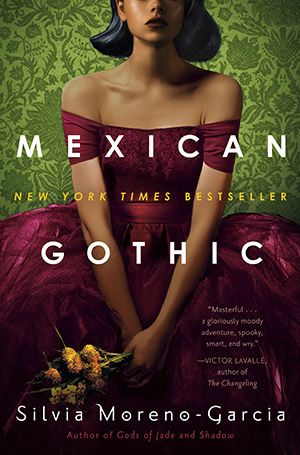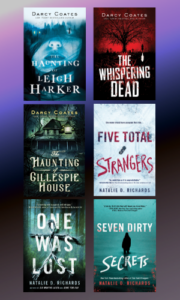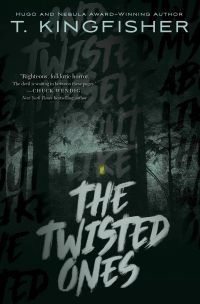Why Do Readers Avoid Horror?
I am a wimp when it comes to scary things. I used to sit with a blanket over my head during horror movie nights with friends, and I’ve only recently graduated to being able to watch horror with knitting in hand to distract me. I don’t like jump scares, I definitely do not like blood and gore, and especially horrifying images will live rent-free in my brain despite multiple eviction notices. I am the type of person who will booby-trap her house if I have to spend the night home alone. In short, being scared stresses me out.
So why do I now find myself gravitating towards horror novels?
At first, I blamed it on the pandemic. In 2020, I was home all the time, dealing with a whole slew of anxieties about staying alive and healthy (things that never used to be at the top of my mind before!), and I was doing a lot of sifting through publisher catalogues for my work with Book Riot. And it just seemed that certain horror novels would jump out at me. My All the Books! cohost Liberty Hardy would mention a horror novel and my brain would go, “That sounds interesting!” Or I’d see a cool cover for a book that was coming out soon and I’d read the description and realize it was horror…and not be turned off by that fact. My partner read The Twisted Ones by T. Kingfisher and declared it the best horror book they’d ever read and I thought, “Cool, I should read that!”
It was baffling to me, but I shrugged it off as a peculiar coping mechanism in the face of society completely shutting down for a while. So, I read some horror novels. And I got a bit freaked out. But I also found that reading about scary things was much better than watching them unfold on a screen (I still hate jump scares, mostly because they absolutely get me every time and then I walk around IRL expecting to turn the corner and find a terrifying figure right there). I also found that most of the horror I gravitated towards felt very similar to the true crime, mystery, and thriller books I already enjoyed…and I liked it?
This whole experience led me to a bit of a self-reckoning and I began to question if maybe I’d been wrong about thinking that horror wasn’t for me. Why did I think it was something to be avoided at all costs? How is reading a horror novel about a stalker any different from reading and being fascinated by say, I’ll Be Gone in the Dark by Michelle McNamara? Isn’t true crime a kind of horror that I do seek out and read? Do I not enjoy atmospheric and creepy fantasy worlds, or haunting fairytale retellings with danger around every turn?
I think reason that many people avoid horror is that it often is misunderstood as a genre. I’d hazard a guess that if we asked most people who don’t regularly consume horror media, “What is horror?” the response would be something along the lines of slasher stories or something with lots of blood and guts. That’s how I viewed it for the longest time. And while body horror is definitely an element found in many some stories, it’s not a prerequisite. In fact, I learned to define horror much more broadly as any story whose goal is to create fear in its audience. And that leaves a lot of room for interpretation.

There’s the “real life” horror, which looks at all the ways humans inflict horror on each other. This gets me the most, because while I’m a supernatural skeptic, I know for a fact that serial killers exist. In that vein, I read There’s Someone Inside Your House by Stephanie Perkins, which takes on one of my biggest fears (there’s someone inside your house who wants to kill you!). There’s funny horror, which understands that laughter is a great way to cut the serious tension of fearing for your life. I read The Twisted Ones by T. Kingfisher on my partner’s recommendation, which made me laugh and shake, and has the bonus of featuring a beloved dog character that doesn’t die. Genre-bending horror like Mexican Gothic by Silva Moreno-Garcia appealed to my love of Gothic fiction and historical fiction. I even found myself getting into horror that incorporated otherworldly elements, such as The Only Good Indians by Stephen Graham Jones (which features some of the best prolonged tension I’ve ever read) and Small Spaces by Katherine Arden (which, yes, is for middle grade readers but don’t be fooled! It’s super creepy!). Then I remembered after all that reading that I love Shirley Jackson’s work, and she’s only just the most influential writer of the genre from the mid-20th century.
Recognizing that horror has as many sub-genres as any other genre I love, and that the levels of gore, tension, and fright exist on a spectrum helped me realize that yeah, horror is for me. It took some time and exploration for me to find what I like in horror, but it was also helpful to name what I don’t like. I’ll probably not be catching up on any cannibal horror any time soon (weak stomach, and I like food too much to go there), and anything with extreme body horror is going to be a giant nope from me. I continue to be ambivalent about ghosts and vampires, but I do enjoy a good witchy read and books that explore scary myths and legends in exciting and new-to-me ways. I like books that are grounded in strong emotional relationships with engaging characters, and things that subvert my expectations. Honing my tastes and thinking about what I do and don’t like has led me to more books and authors I otherwise never would have picked up!
Some people just don’t like to be scared while reading for entertainment, and I completely respect that. But if you’ve ever thought that you’re not into horror, or that horror is just one type of thing, I urge you to look to some genre-bending horror, or seek out recommendations for something that might be closer in genre and vibe to what you already enjoy reading. Take it slow, feel free to bail if it gets to be too much, and know there is no shame in reading with the lights on! If you too discover that you’re actually a horror fan, then welcome! There’s so much to explore.



إرسال تعليق
0 تعليقات